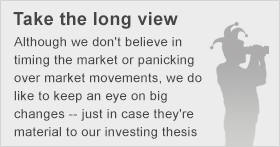
After three straight days of losses, the Dow Jones Industrials (^DJI 0.65%) still didn't come up with lasting upward momentum this morning. Initially, the Dow rose after a slightly bigger rise in retail sales figures than economists had forecast, as well as an unexpected drop in weekly initial unemployment claims. Yet by 11 a.m. EDT, the index had fallen 32 points; none of the Dow's 30 stocks had moved more than 1%, indicating an unusual lack of volatility as investors wait for clarity on the many uncertainties in the market. Nike (NKE 2.82%) rose the most of the Dow's components, and Boeing (BA 0.03%) tried to gain back some of the ground it lost in recent days.
Nike gained 0.7% as the athletic-apparel maker likely benefited from the 0.3% climb in retail sales. Many sellers of retail goods have noted that the harsh winter weather contributed to poor sales performances recently, but the opportunity to capitalize on shoppers staying at home by enhancing e-commerce capabilities is one that Nike has jumped on. With the recent holiday season showing the value of having an online presence, Nike has launched international websites and expanded its nike.com main page offering. In addition, Nike's continuing dominance in getting high-profile endorsements, including the signing of heralded football quarterback Johnny Manziel prior to his inaugural NFL season, has kept Under Armour (UA 2.79%) and other competitors from unseating the athletic giant.
After a strong start Boeing was just over breakeven, regaining a very small part of the losses it suffered earlier in the week. News of even more potential 737 MAX orders from India, this time from Air India and Jet Airways, once again showed Boeing's appeal to airlines around the world. India is a huge potential market for Boeing, but it's also located much closer to the site of the disappearance of a Malaysia Airlines Boeing 777, and so the aircraft manufacturer has to be careful to handle the tragedy without spooking its potential customers. In the past, Boeing has done a good job preserving shareholder gains even through equally controversial issues. Still, at some point, the mass of news could become too difficult for bullish investors to endure.
